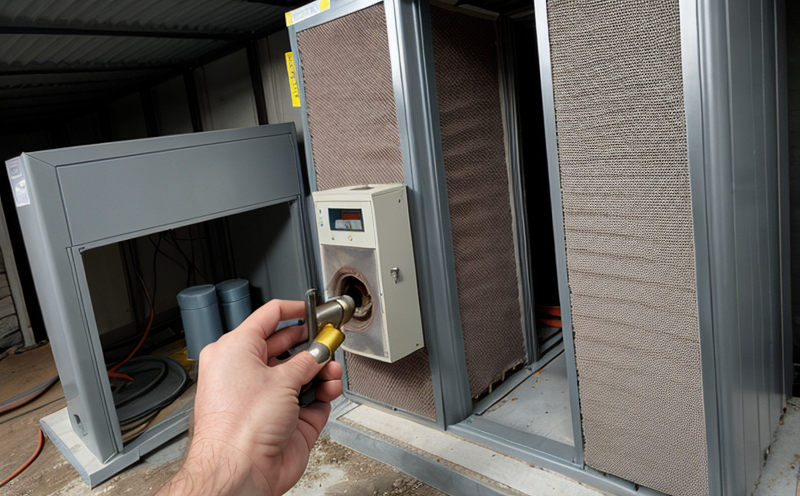ISO 12127-1 Protective clothing Contact heat transmission test method
The ISO 12127 series of standards provides a comprehensive framework for evaluating the thermal protective performance of protective clothing, with ISO 12127-1 specifically addressing the contact heat transmission. This standard is crucial for manufacturers and users in ensuring that personal protective equipment (PPE) meets stringent safety requirements under various thermal stress conditions.
The contact heat transmission test measures how much heat a material can transfer from one side to another, simulating real-world scenarios where workers might be exposed to sudden increases in temperature. This is particularly important for industries such as firefighting, welding, and other high-risk environments where the correct PPE can mean the difference between life and death.
The test method outlined in ISO 12127-1 involves placing a heat source onto one side of a specimen while maintaining a controlled temperature on the opposite side. The rate at which the heat is transmitted through the material is measured using thermocouples or similar sensors. This process allows for precise determination of the thermal resistance provided by the fabric.
Preparation of specimens involves selecting representative samples that accurately reflect the properties of the production batch. These samples are conditioned under specified environmental conditions to ensure consistency with industrial practice and testing accuracy. The test setup includes a heated plate on one side, a cooled plate on the other, and precise measurement equipment to capture thermal flux data.
The results from this standardized procedure provide critical insights into the performance of protective clothing against heat transfer. Compliance with these tests ensures that workers are adequately protected in hazardous environments. This is essential for maintaining regulatory compliance and ensuring worker safety.
For R&D engineers, understanding ISO 12127-1 can lead to innovations in fabric design and material selection, improving the thermal performance of protective clothing. Quality managers benefit from this knowledge by aligning production processes with international standards, thereby enhancing product quality and reliability. Compliance officers find it invaluable for ensuring that their organization adheres to all necessary safety regulations.
Proper interpretation of ISO 12127-1 data is crucial for making informed decisions about material selection and process optimization. It ensures that the end products meet or exceed regulatory requirements, providing a robust foundation for product development and quality assurance.
Industry Applications
| Industry Sector | PPE Type | Application Scenario |
|---|---|---|
| Fabric and Textile Manufacturing | Multilayer fabrics | Evaluation of new fabric blends for enhanced thermal protection. |
| Firefighting | Protective jackets, trousers, hoods | Determining the adequacy of protective garments during fire rescue operations. |
| Metalworking and Welding | Gloves, aprons, face shields | Evaluating thermal resistance of welding gloves in high-temperature environments. |
| Chemical Processing | Bodysuits, aprons, sleeves | Assessing the thermal protection provided by chemical splash suits. |
| Construction | Gloves, coveralls, helmets | Evaluating thermal performance for workers in hot and hazardous environments. |
| Hazardous Waste Handling | Bodysuits, gloves, boots | Ensuring appropriate protection against heat stress during waste management tasks. |
The contact heat transmission test is particularly useful in these industries where the risk of thermal injury is high. By adhering to ISO 12127-1 guidelines, manufacturers can ensure that their products meet or exceed industry standards, thereby enhancing worker safety and compliance with regulatory requirements.
Eurolab Advantages
EuroLab offers a range of advantages when it comes to conducting ISO 12127-1 testing. Our state-of-the-art facilities provide accurate, reproducible results that are essential for meeting international standards. With experienced technicians and advanced equipment, we ensure that every test is conducted with precision and reliability.
Our commitment to quality extends beyond just the technical aspects of the tests. We offer comprehensive support throughout the testing process, from specimen preparation to result interpretation. This includes detailed reports that explain not only the results but also their implications for product design and safety.
EuroLab's expertise in this area allows us to provide valuable insights into how materials perform under real-world conditions. By leveraging our extensive experience and cutting-edge technology, we can help you make informed decisions about your PPE designs and ensure that they meet the highest standards of safety and performance.
Competitive Advantage and Market Impact
EuroLab's proficiency in ISO 12127-1 testing provides a significant competitive edge for our clients. By ensuring compliance with this international standard, we help manufacturers differentiate their products in the marketplace. This not only enhances brand reputation but also contributes to increased market share by offering safer and more reliable protective clothing.
Our ability to provide accurate and consistent results is particularly important in today's highly regulated environment. Regulatory bodies often require proof of compliance with international standards, and EuroLab can offer that assurance. By partnering with us, you not only gain access to world-class testing facilities but also demonstrate a commitment to worker safety and regulatory compliance.
In an increasingly competitive global market, the ability to produce high-quality protective clothing is crucial. EuroLab's expertise in ISO 12127-1 testing helps our clients stay ahead of the curve, ensuring that their products meet or exceed international standards. This not only enhances product quality but also contributes to increased customer satisfaction and loyalty.





